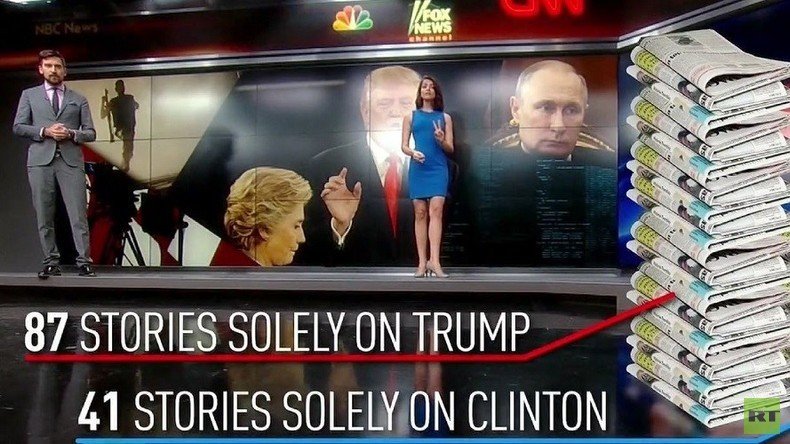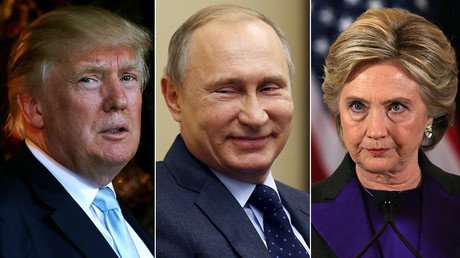‘Fail Stream Media’: RT America special on how mainstream journalists became fake news

The mainstream media has been heavily criticized over the last year due to its biased coverage of the US presidential election, the Syrian crisis and other stories. In a special report, RT America looks at how certain news outlets’ credibility was undermined.
In “Fail Stream Media,” RT America’s Alexey Yaroshevsky and Anya Parampil take a look at why the mainstream media failed at objectivity when reporting the important stories of 2016. While outlets from CNN to even Fox News called Republican Donald Trump “a clown” and “a joke,” they were also responsible for his meteoric rise to the White House.
Media watchdog Fairness and Accuracy in Reporting (FAIR) looked at 128 front-page campaign stories by three major newspapers over the course of two months. Their analysis found that Trump got twice as much coverage as his Democratic rival, Hillary Clinton.
“The coverage did not focus on the issues much ‒ it covered less than 12 percent ‒ and the majority of it was campaign strategy pieces that really just focused on the horse race… who was teetering or who was gaining ground,” FAIR’s Ben Johnson told RT. “A lot of polling, too. That made up around 60 percent… which didn’t really tell the voters anything.”
Once Trump surprised the pundits and pollsters by winning the election, some news outlets, like the New York Times, issued a mea culpa. Others remained defiant, seemingly declaring war on the incoming administration. RT became a favored scapegoat, with some analysts (and even the Office of the Director of National Intelligence, or ODNI) suggesting that the network had chosen Trump as its favored candidate ‒ even though “News with Ed” host Ed Schultz recorded numerous exclusive interviews with darkhorse Democratic presidential candidate Bernie Sanders, the same candidate ignored by the mainstream outlets.
‘You are #fakenews’: War breaks out between supporters of #Trump & media on Twitter https://t.co/Ge3BITEVZopic.twitter.com/pLaCnaaBCt
— RT America (@RT_America) January 11, 2017
“I was waiting to see the case made,” media and legal analyst Lionel, of Lionel Media, told RT America. “I’m a lawyer by trade, and I have this thing called proof, and I understand that if an accusation is made, there should be some kind of connector, the accusation to the proof, and nothing was there.”
“If this was an indictment, it would be dismissed basically for lack of a case,” he continued. “To say that it was breathtakingly incoherent would be complimentary.”
The media’s black eye on politics culminated with the reporting on accusations that Russia interfered with the election. Between the ODNI report that heavily featured RT and the release of a questionable dossier of blackmail material on Trump supposedly collected by the Russian intelligence Kompromat program, journalists salivated at the idea of tying the incoming American leader with Russian President Vladimir Putin, to the point that they never took a step back to see how realistic these documents actually were.
“The way they behaved on the Russia stuff was outrageous,” Pulitzer Prize-winning investigative journalist Seymour Hersh told The Intercept in an interview for Jeremy Scahill’s inaugural podcast. “They were hectoring. They didn’t do reporting.”
The ODNI report wasn’t “a national intelligence estimate. If you had a real estimate, you would have five or six dissents. One time they said 17 agencies all agreed. Oh really? The Coast Guard and the Air Force ‒ they all agreed on it? And it was outrageous and nobody did that story. An assessment is simply an opinion. If they had a fact, they’d give it to you. An assessment is just that. It’s a belief,” Hersh said.
The presidential election wasn’t the only topic on which media outlets failed to remain credible. Its coverage of Syria, especially the retaking of Eastern Aleppo by government troops, was questionable. The mainstream media appeared to do everything possible to discredit Russia’s role in the Syrian conflict, mainly by stressing that Moscow backed President Bashar Assad, rather than the Washington-backed rebels. They also ignored reports that Al Qaeda-linked terrorist group Al Nusra had infiltrated the American-supported Free Syrian Army.
Journalists reporting in Syria burned their relationships with Assad by getting access to the war-torn areas of the country with security and access provided by the government, “and then they say, ‘What an evil dictator Assad is,’ and there isn’t a second side to it,” RT correspondent Murad Gazdiev told Yaroshevsky and Parampil. “Interestingly enough, they never seem to go in on the side they’re reporting, on the rebel side.”
Gazdiev has been on the ground covering Syria from a different angle. He was the first journalist to report that the black Islamic State (IS, formerly ISIS/ISIL) flag was flying in East Aleppo. It took a month for those journalists to acknowledge misdeeds by the rebels, he said, and they never reported Russian and Syrian actions that didn’t fit their preconceived narrative.
“These journalists come into Aleppo, they film whatever they want, they have access to pretty much the whole city, and they pump out enormous, almost exclusively anti-Assad, pro-rebel rhetoric,” he said. “All these journalists, western journalists from big companies that came into Aleppo while I was there, there was a month where there were no Russian airstrikes, no Syrian government airstrikes on Eastern Aleppo, the besieged part of Eastern Aleppo. None of them said so. None of them said that the Russians and the Syrians aren’t bombing.”














